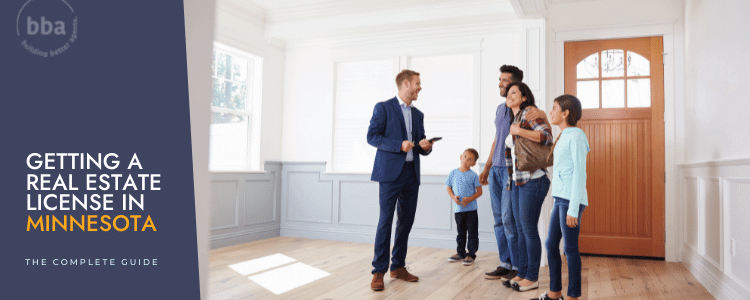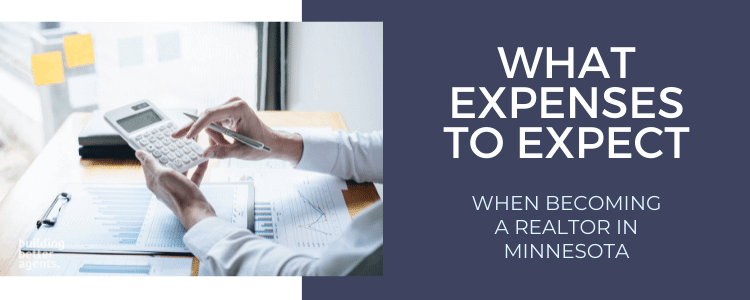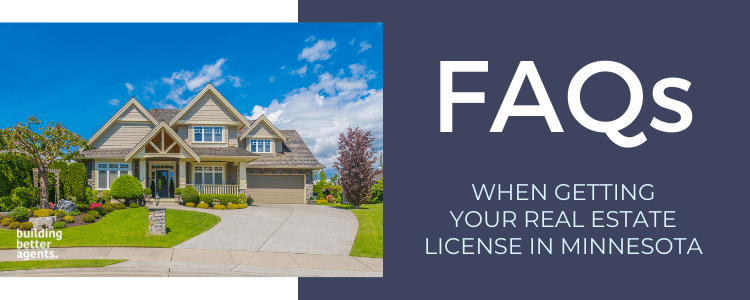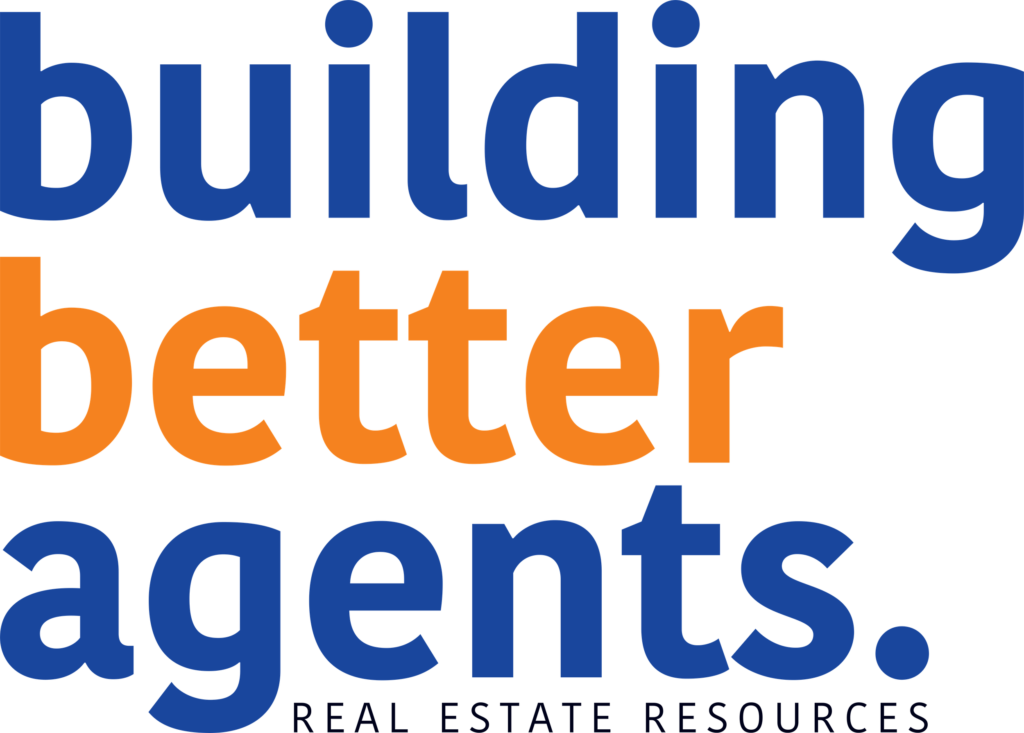How to Become a Real Estate Agent in Minnesota
Ready to get your real estate license in Minnesota?
Excellent choice. This is an incredible opportunity for entrepreneurs, offering almost unlimited growth potential. So whether you are planning to do real estate part-time or are making it your new full-time career, we are going to guide you through the process and share everything you need to know to become a real estate agent in Minnesota.
We’ll cover:


Steps to Get a Real Estate License in Minnesota
The Minnesota Department of Commerce requires that you be In order to become a licensed real estate agent in the state, you must be at least 18 years old and complete the following steps:
- STEP 1: Complete three (3) courses for a total of 90 hours of the real estate pre-licensing course
- STEP 2: Sign up and pass the Minnnesota state real estate exam with a score of at least 75%
- STEP 3: Select a sponsoring brokerage
- STEP 4: Submit an application to the Real Estate Commission
Please note that your sponsoring brokerage is required to submit the real estate license request on your behalf through the MCD online PULSE Portal. The application fee is $110.
For more information, download the Guide to Real Estate Licensing, brought to you by the Minnesota Commerce Department.
Understand How Long it Takes to Get a Real Estate License
If you do the online pre-licensing course, you can go at your own pace and potentially finish in about 3 weeks. It typically takes a few weeks to get your appointment for the state exam. Then, the last thing to do in becoming a licensed real estate agent is to wait for approval from the Commerce Department. Although the approval process for renewals tends to take only seven days, new application processing can take much longer. Demand on the department greatly impacts processing time, so it might be best to expect approval to take several weeks. All in all, you could potentially get your license within 8 weeks, but for most aspiring agents it will take three to six months.


Cost to Get a Real Estate License in Minnesota
There are several fees involved when getting your real estate license Minnesota…
- Pre-License Real Estate Course – $350 to $900
- Exam Prep Course (optional) – $199 to $250
- Background check – $33.25
- Application Fee – $110.00
- State Exam Fee – $65
- Annual License Renewal Fee – $60
** Total Estimated Cost to Get Licensed = $800 to $1,600
More Expenses to Expect as a Realtor
Getting a license is just the beginning! What many aspiring Realtors don’t realize is that there are several other costs to consider when becoming a real estate agent. Whether you’re building a new business and opening a dance studio, coffee shop, or starting your real estate empire, keep in mind there are always start-up costs involved.
Here are some of the most common expenses:
- Post-License Continuing Education Fee – $100 to $200
- Annual State License Renewal Fee – $60
- National and Local Board of Realtors – $500+ each year
- Minneapolis Area Realtors – $882.50 annually
- Lake Superior Board of Realtors – (Call for membership fees)
- Realtor Association of Southern Minnesota – $1,125 annually
- Grand Forks Area Assn of Realtors – $1,219 annually
- St Paul Area Assn of Realtors – (Call for membership dues)
- Multiple Listing Service (MLS) – about $150 to $175 quarterly
- Sentrilock or Supra eKey to show homes – $100 to $150 annually
- Business cards and signage – varies
- Marketing materials and advertising – varies
- Brokerage joining fee – $0 to $500 (average is about $250)
- Monthly Brokerage fee – ranges from $0 to $350 monthly
** Total Cost to Become a Real Estate Agent in Minnesota = $2,000 to $3,100
Learn more about costs to become a real estate agent in Minnesota:
Find the Top Real Estate Schools
To get your real estate license, you’ll have to attend a school that’s approved by the Minnesota Real Estate Commission. There are at least a dozen approved real estate schools throughout the state. Some are online, others in person, and a few do a combination of the two.
Here are a few of the most popular:
When shopping for the top online real estate schools, you’ll want to compare pricing, but there are a few other things you will need to consider:
- Do they share their “pass rate”? This will tell you what percentage of their students passed the state exam on the first try.
- Does the school offer any guarantees if you don’t pass? For example, one school will pay the fee for you to retake the state exam.
- Are practice tests given to the students or is there any additional charge?
- Do they offer a separate exam prep course or a weekend cram course?


How Select a Real Estate Broker
In Minnesota, you must affiliate with a real estate brokerage in order actively help home buyers and sellers. This is often referred to as the “sponsoring broker” or “managing broker.” Picking the right brokerage to work with can be key to your success as a newly licensed agent.
We would recommend shopping for the best broker once you’ve completed the pre-licensing course and are waiting to take your state exam or while Minnesota is processing your application. There are a few ways to do this:
- Ask around. Find out which brokerages your friends and family have worked with in the past and see what they liked most about them. Don’t hesitate to reach out to local agents in your area to see what they like most about their broker.
- Research online. Once you’ve narrowed down your choices to 3 to 5 companies, do some research online. There are always dozens if not hundreds of YouTube testimonials and feedback from real estate agents.
- Check out Facebook/Meta. There are quite a few Facebook groups for aspiring agents and you’ll get lots of (honest) feedback from agents at different brokerages.
- Schedule interviews. We highly recommend meeting (in person, phone or a zoom) with two or three brokerages, because the benefits and commission splits can be dramatically different from one firm to the next.
When researching and meeting with different brokerages, keep in mind that many are independently owned franchises. So one Century 21 or Keller Williams office could be completely different from another that’s just 10 minutes away. The culture, training, support team, and sometimes even the fees and commission splits can vary from franchise to franchise.
Don’t miss our latest article…
Is it Easy to Become a Real Estate Agent in Minnesota… and Succeed in the 1st Year?
You made it through 90 hours of classes, passed the state exam, and selected a great broker — congrats! The next step is getting you mentally prepared to build a successful, thriving new business.
As a new REALTOR, you need to have a fire in your belly! Your motivation and desire to learn everything you can be critical to your success – especially in your first year in real estate. Many of you may be used to working for someone and being told what to do at work each day, but that isn’t the case in real estate.
You are officially a business owner, so it’s key that you start focusing on:
- Building your personal network. Being a successful real estate professional means having a large network of people that like and trust you. If you don’t already have a network or sphere of influence, you’ll need to regularly get out, socialize, network and meet new people. Once you’ve built up a substantial network, you have to find ways to stay top of mind with your network. This could include things like sending out a monthly newsletter, birthday cards, and connecting on social media.
- Becoming a neighborhood expert. If you want to be the go-to REALTOR in your area, you need to know your local market. This could include touring homes in the area, researching new developments, studying the real estate sales statistics, and letting as many people as possible know that you are here to serve them.
- Marketing and promoting yourself online. From blogging on your website to running Facebook ads, posting on social media and networking in local online groups
- Understanding how to talk to potential clients. It’s so important that you learn how to connect and communicate with people about real estate and how to overcome objections.
Kerry Lucasse and the Building Better Agents team talk with hundreds of newly licensed real estate agents each year. Most have no idea how challenging the first year or two can be and how much you need to learn to be successful. This business is not as easy as it looks on TV! Real estate can be a rewarding and profitable business if you are a self-starter who is 110% committed to being successful and you have the support of a great mentor and brokerage.


Frequently Asked Questions
Is the Minnesota real estate exam hard?
Most agents will describe the real estate licensing exam as “not easy.” It’s important that you take lots (and lots!) of practice tests to prepare for the exam. If you still aren’t feeling 100% comfortable about passing, we highly recommend taking an exam cram course online. Many of the top real estate schools offer an exam prep course for less than $150.
You need a minimum score 75% to pass the Minnesota Real Estate Salesperson Exam, with (at least 60/80 on the national portion and 38/50 on the state portion).
How many questions are on the exam?
The Minnesota salesperson exam consists of 80 national questions and 40 questions that are state-specific. All are multiple choice and you’ll have 4 hours to complete the exam.
What if I fail the real estate exam?
If you fail all or part of the exam, you only need to retake the failed portion of the exam. Reservations for reexamination may not be made at the test center, and candidates must wait 24 hours before scheduling to ensure previous exam results are processed. The fee is $65 per attempt.
How do I become a real estate broker in Minnesota?
To become a broker, you must have a minimum of three years of active licensed real estate experience (within five (5) years of applying for the brokers exam). The experience must be obtained in Minnesota or another state with comparable requirements. A 30-hour Broker’s course is required before you sit for the broker exam. After passing the exam, apply for license as either a primary broker or become associated with a licensed primary broker. If you choose the latter route, the primary broker must submit the application for your license. The fee is $190.00 ($150 plus a $30 for the real estate education, research and recovery fund and a $30.00 technology surcharge.
I have a real estate license in another state. Does Minnesota offer reciprosity?
If you are a licensed agent in Florida or Michigan, for example, and would like to get your license in another state, many US states have a “reciprocity agreement” with one another. This means that you don’t have to attend any additional classes, you just have to pass the state portion of the exam to hold an active real estate license in that state.
In Minnesota, the applicant must reside in and hold an active real estate license in one of the following reciprocal States: Colorado, Iowa, Nebraska, North Dakota, South Dakota, and Oklahoma. A Minnesota licensed primary broker must submit the application on the behalf of the non-resident. The fee is $130.00 and you can apply on the PULSE Portal.
What are the requirements for Continuing Education?
Minnesota Department of Commerce requires that newly licensed agents take 15 hours of continuing education each year. You can take CE courses online and usually there are several free CE courses available throghout the year with your local REALTOR association or brokerage.
Is Getting a Minnesota Real Estate License Worth It?
Honestly, it depends on what your goals are. If you just want to sell a few homes each year to friends and family, you’ll have to crunch the numbers to see if the cost of getting and maintaining your real estate license is worth it.
If your plan is to jump in and build a thriving business, then absolutely! The real estate market is booming. It can be a challenge moving from a salaried position to a commission-based business, so it’s important to have at least six months of savings in the bank. If you don’t have that yet, then you may want to keep your current job for a short period of time until you are able to lay the foundation for your new real estate business and get a consistent stream of sales each month or quarter.
Other Articles + Resources You Might Like:


Let's Work Together
I’ve helped hundreds of agents build successful businesses, generate more leads, and expand their teams into multiple states.

